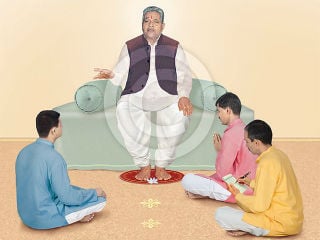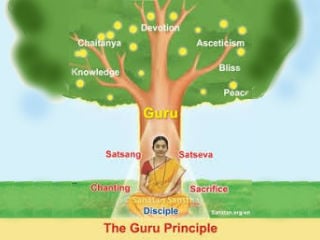Today, the daily life of most people is filled with hectic activity and problems. One who imparts precise knowledge on appropriate spiritual practice for acquiring peace of mind and Anand (Bliss) and how to perform it is none other than the Guru. Saint Tukaram Maharaj says, without the help of a Sadguru, we cannot find our path to Moksha (Final Liberation); hence, we should first hold the Guru’s feet, that is, we should make efforts to obtain His grace. In the life of a disciple, the Guru holds supreme importance; because a disciple cannot realise God without the Guru. Through this article let us understand origin and meaning of Guru, different forms of Guru and the greatness of Guru Principle.
1. Origin of word Guru
1A. गुशब्दस्त्वन्धकारः स्यात् रुशब्दस्तन्निरोधकः ।
अन्धकारनिरोधत्वात् गुरु इत्यभिधीयते ।।
Meaning : ‘Gu (गु)’ refers to darkness assuming the form of ignorance and ‘ru (रु)’ to the radiance in the form of spiritual knowledge, which dispels this darkness. Thus, the Guru is the one who dispels the darkness of ignorance.
1B. Shrī Gurugītā describes several origins of the word ‘Guru’.
गुकारस्त्वन्धकारश्च रुकारस्तेज उच्यते ।
अज्ञानग्रासकं ब्रह्म गुरुरेव न संशयः ।। २३ ।।
Meaning : The letter ‘Gu (गु)’ in ‘Guru (गुरु)’ refers to darkness (Ignorance), while the letter ‘ru (रु)’ refers to light (Spiritual knowledge). Thus, undoubtedly, Guru is Brahman who alleviates this ignorance.
गकारः सिद्धिदः प्रोक्तो रेफः पापस्य हारकः ।
उकारो विष्णुः (पाठभेद – शंभुः) अव्यक्तस्त्रितयात्मा गुरुः परः ।। – Āgamsār
Meaning : ‘Ga (ग)’ in ‘Guru (गुरु)’ bestows siddhīs (Supernatural powers), ‘ra (र)’ alleviates sins and the ‘ou (उ)’ is the unmanifest Shrīvishṇu (Vairation – Shiva). In other words, Guru is supreme, the embodiment of these three.
2. Definition and meaning
Some definitions and meanings of the word ‘Guru’ are provided ahead.
-
The Guru is the one who dispels a disciple’s ignorance, advises him to perform spiritual practice so as to make spiritual progress, gets it done from him and bestows spiritual experiences upon him. The Guru’s attention is only on the disciple’s spiritual progress and not on his worldly happiness (since that depends on his destiny).
-
The Shakti (Divine Energy) of Supreme God to bestow grace is the Guru.
-
The Guru is the one who is not minuscule, yet He is the one who transforms the minuscule into a Guru (The great one).
-
In the second chapter of Shrī Gurucharitra, the name given to the Guru is ‘Vēdadharma’, meaning, the ‘Vēdadharma’ bestows the status of ‘Sadguru’ only on the one whose physical, verbal and mental actions are as per the Vēdas.
-
God and a devotee are not distinct from each other; being unmanifest, God is only unable to speak to a devotee who has body-awareness. Hence, He introduces the devotee to His kārya Brahman (Functional God Principle). Such kārya Brahman is known as a Guru. In other words, He Himself speaks using the Guru as a medium.
3. Form of the Guru
3A. A disciple’s faith
The Guru depends on faith. In faith lies the greatness of the Guru. The Guru depends on your faith too. He lies in your faith.
Implied meaning : In ‘The Guru depends on faith. In faith lies the greatness of the Guru’, the word ‘Guru’ refers to the Guru’s external form. Only if one has faith in a Guru can He function as a Guru. ‘The Guru depends on your faith too. He lies in your faith’ refers to the omniscient Guru within oneself.
3B. Answer clarifying the doubts
A question expressing doubt is the disciple and its answer clarifying the doubt is the Guru. So long as the darkness of ignorance in the form of questions is not eliminated and one does not obtain knowledge by constant clarification of the doubts, this debate will continue. In reality, the Guru and the disciple are one and the same.
4. The Guru Principle
Greatness of the Guru Principle lies in the fact that it helps dissolve the ego and takes the individual towards God : The greatness of the Guru Principle lies in the fact that it takes the individual beyond the defects of the mind, controls the intellect, bestows Chaitanya (Divine consciousness) upon the subconscious mind, dissolves the ego and takes the individual towards God.


 The one and only Guru-disciple tradition of the Sanatan Sanstha which has proven special in...
The one and only Guru-disciple tradition of the Sanatan Sanstha which has proven special in... Who is proclaimed a Saint as per Science of Spirituality ?
Who is proclaimed a Saint as per Science of Spirituality ? Faith & Guru
Faith & Guru Who is a real Guru ?
Who is a real Guru ? The Guru Principle
The Guru Principle Offering gratitude unto the Holy feet of the Guru is true Gurudakshina !
Offering gratitude unto the Holy feet of the Guru is true Gurudakshina !